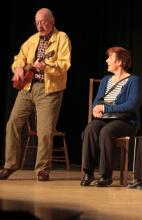Liz Klassen felt the need to correct the rumour going around among the seniors that the play Cracked made fun of folk with dementia. Klassen, executive director of the Nithview Community in New Hamburg, operated by Tri-County Mennonite Homes, notes that the name of the play comes from Leonard Cohen’s 1992 song "Anthem" from his album The Future:
Ring the bells that still can ring;
Forget your perfect offering
There is a crack in everything
That's how the light gets in.
Cracked: New Light on Dementia is a 50-minute play exploring dementia from the perspectives of persons with dementia, their family and friends, and the institutions which are called on to care for them as the disease takes its course.
Over 700 folk came to the four shows on October 27 and 28 at Nithview and enthusiastically talked about how the play accurately portrayed the struggles of family and friends as they try to support their loved ones. The play suggested some of what might be going on in the minds of people who have dementia, even while outwardly they might be unresponsive. Audience members responded emotionally to the continuing loss of function and memory experienced by family members and friends with dementia.
But the play, full of humour and pathos, was more than entertainment or education—groups of local audience members took part in focus groups before and after the shows, as part of an ongoing research project. They were reporting on their knowledge and attitudes about dementia and the care of people with dementia, and how the play influenced that knowledge and those attitudes.
Researchers from the universities of Toronto and Waterloo, and Partnerships in Dementia Care Alliance worked with director/writer Julia Gray and the ensemble of professional actors to develop the characters as realistically as possible. Dr. Sherry Dupuis, one of the researchers, told the crowd at the last performance that they were trying to get out the idea of “relation-centred” care. While “patient-centred” care has been the gold-standard for care for many years, relation-centred care takes into consideration all the relationships in which the person is—family, friends, staff in institutions etc.—and considers how to balance the care of all those people.
In the Q & A time after the performance, when questioned by an audience member about how to deal with a loved one who needs more care but is resistant to being institutionalized, Dupuis noted that not only the patient’s opinions need to be listened to, but also the caregiver’s. She emphasized that the new relation-centred focus still gives value to the individual with dementia, while seeking to create space for him or her to continue with meaningful activities. The person does not need to become someone else to suit the program or rules of the care-giving institution.
The play has been performed in academic and professional settings as well as arts festivals, with plans for more performances in the future. For more information see https://uwaterloo.ca/partnerships-in-dementia-care/re-imagining-dementia-through-arts/cracked-new-light-dementia.




Add new comment
Canadian Mennonite invites comments and encourages constructive discussion about our content. Actual full names (first and last) are required. Comments are moderated and may be edited. They will not appear online until approved and will be posted during business hours. Some comments may be reproduced in print.